PERSONNEL
PERSONNEL
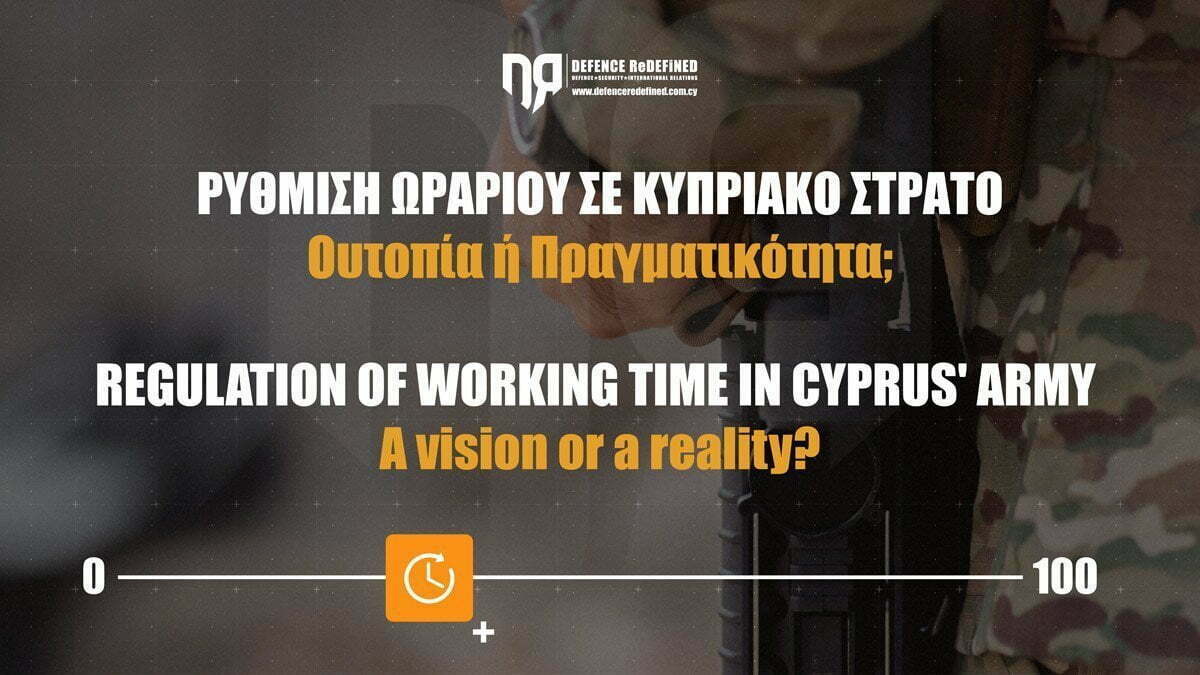
The Cypriot Army (permanent staff) and the National Guard (conscripts, professional soldiers and dispatched permanent staff) are the Armed Forces, which together with the Police and the Cyprus Fire Service (Security Forces), are the organizations that provide security with its broader meaning in the Republic of Cyprus.
The operation of the Security and the Armed Forces is governed by different Laws and Regulations, but members of the Cypriot Army fall in the only category of civil servants who do not have their working hours regulated by statute. The weekly working hours of the staff, the duties they perform, the exercises and in general all the activities in which they participate are regulated by orders of the General Staff of the National Guard (GSNG). The “Army of the Republic Law” as well as the “Law of the National Guard” provide for the possibility of the regulation of various issues including, among others, the working time of the permanent staff. In practice, however, there is still no statutory provision i.e there is no regulation concerning the working time.
The regulation of the working time for the personnel of the Armed Forces has concerned both the Cyprus Army Officers (CAOA) and Non-Commissioned Officers Associations (NCOACA) since 2014. Apart from them this issue concerns the Parliamentary Committee on Defence. A typical example is that after many months of regular discussions in May 2015, the relevant regulations on the “Working time and Duty of the Members of the Army of the Republic” – while they had already been submitted by the Ministry of Defence for voting in Parliament – they were withdrawn at the last moment. According to the ministry of Defence, this was done due to operational reasons.
The withdrawal of the Working Time Regulations in 2015 was followed by strong complaints on the part of the Army personnel. CAOA and NCOACA Associations claim that through the institutionalization of the working time, the injustice and arbitrariness observed due to the uniformity of the working time (which is partly due to the different nature of the Army Units) will be eliminated. On the other hand, the regulation of working time is necessary for the health and safety of the personnel and consequently the people that each officer or Non-Commissioned Officer has under his responsibility. In fact, when asked by the European Commission, the answer given, among other things, was that the usual activities of the armed forces are covered by the European Working Time Directive (DIRECTIVE 2003/88 / EC). The question was jointly submitted in 2015 by the then MEPs Neoklis Sylikiotis, Takis Hatzigeorgiou, Eleni Theocharous, Lefteris Christoforou, Costas Mavridis and Dimitris Papadakis, following a discussion with a delegation from the CAOA and NCOACA. It should be noted that inmany of the EU member states’ Armed Forces, such as Greece and Germany, the relevant provisions that regulate the issue of working time have been in force for many years.
An important point of the 2015 Working Time Regulations was the lack of provision for the granting of any form of monetary compensation to executives due to the performance of special duties, such as for the performance of exercises and duties. Instead of monetary compensation, they provided for the granting of rest time, but not proportional to the additional working hours. The weekly schedule was set based on the provisions of the then Regulations at 37.5 hours with additional performance of special tasks such as exercises and duties which would be determined based on operational needs by the Chief of Defence with the approval of the Minister of Defence.
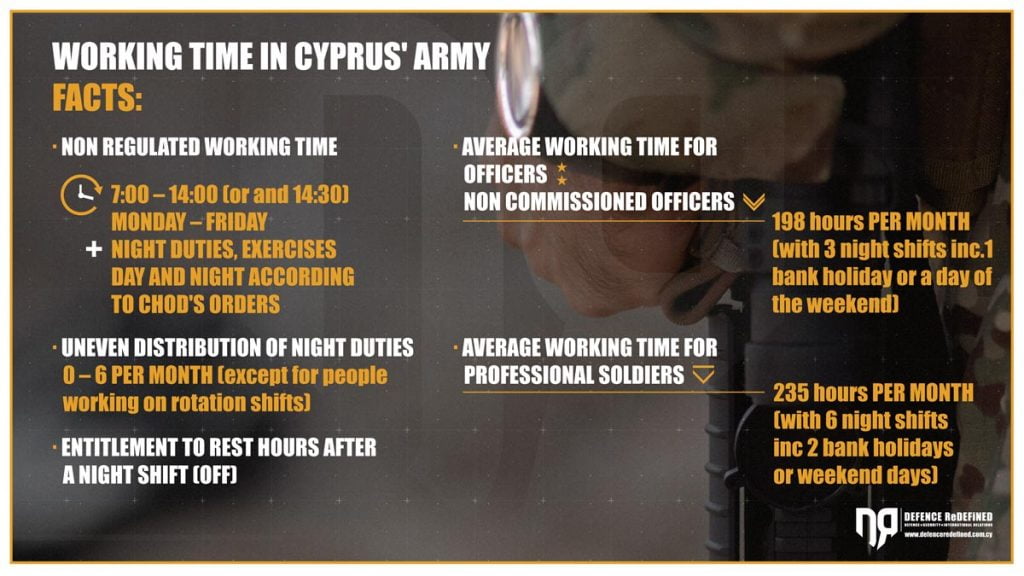
What applies to working hours in the Cypriot Army today *
* Data for Working Average: 22 working days / month, deduction of exemption time and “service break”, including 7 hours per month for Night Training (N / E). Exercises are NOT included. Although the recruitment of professional soldiers is not governed by the Law on the Army of the Republic, they are nevertheless calculated in the example for the presentation of a more complete picture of the schedule.
The decision to withdraw the Working Time Regulations in 2015 was followed by the decision to allocate 120 executives, the vast majority of non-commissioned officers, to assist the Cyprus Police in guarding Larnaca and Paphos airports. The ministry of Defence then stated that this is not against the normal operation of the Army Units.
The arrival of the professional soldier at the end of 2016 could be, as we were told, the occasion for the voting of Working Time Regulation in the spirit also of the slogan “The National Guard is changing” (by the Ministry of Defence) but without anything changing regarding the settlement of this serious issue. The obligation of the 1st series of professional soldiers to execute 8 night duties without any compensatory measure (e.g. rest time after performing a service), was, among other things, one of the reasons for the resignation of about 20% of that group.
Since then, the Ministry of Defence and the National Guard have decided to improve the working conditions of professional soldiers and proceeded with the reduction of the number of performed night duties along with the granting of non-economic benefits, after the completion of each duty, as is the case for the other permanent personnel.
Today, in the year 2020, new Working Hours Regulations are, as we were told, in the Legal Service for preliminary check and developments are expected soon. The reasonable question for all the Armed Forces personnel is whether the Working Time Regulations will be a reality this time or whether it will continue to be a vision for another year.
Also read:
Results announcement for Class 2024 reserve officer candidates
The results of the selection exams for Class 2024 reserve officer candidates were delivered by the representative of the Rector of the…
Military Academies | Number of admissions for academic year 2024 – 2025
The joint decision of the competent Ministries of National Economy and Finance, National Defence and Education, Religion and Sports…
Ministry of Defence | Measures approved for the modernization of the institution of Contracted Soldiers
The 2024 Regulations of the Army of the Republic were approved today by the Cabinet (Dangerous Mission Allowances and Other Related…
EUROSATORY 2024 | Missile Artillery Solutions from MBDA
With such a large number of interested attendees at MBDA’s pavilion at the Eurosatory 2024 Defence exhibition, the stand reminded of an…
KNDS | Showcases full range of LEOPARD battle tanks at EUROSATORY
KNDS continues to expand its technological advantage in the field of main battle tank development, as we have witnessed at the Defence and…
THEON SENSORS | Distinguishing appearance at EUROSATORY 2024 with new range of products
THEON SENSORS attended the International Defence and Security Exhibition EUROSATORY 2024 as an ambassador of Greek innovation…
Ministry of Defence | Organization of Hellenic EDF Info Day
A Conference entitled “EDF Info Day” is organized in the Amphitheater of the National Gallery on Tuesday, July 9 from 09:00 to 17:00.
ALTUS LSA | Participates in EUROSATORY 2024 with KERVEROS in the foreground
The participation of ALTUS LSA in EUROSATORY 2024 is among the Greek participations of operational significance.
Freddy Beleris | Ιn jail until October
The elected mayor of Heimarra and Member of the European Parliament of New Democracy will remain in prison until October…




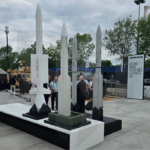
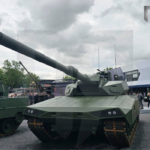



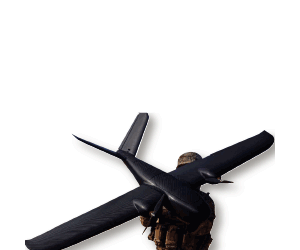
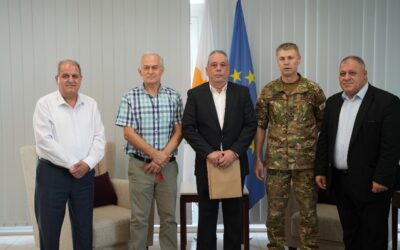
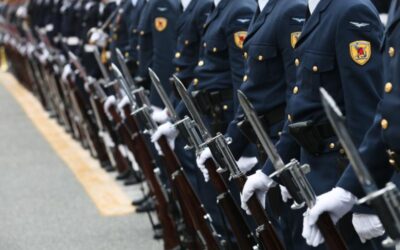
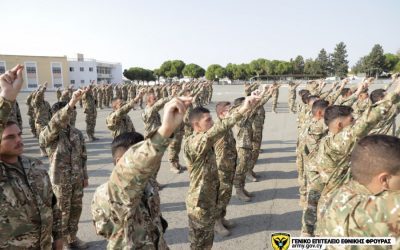
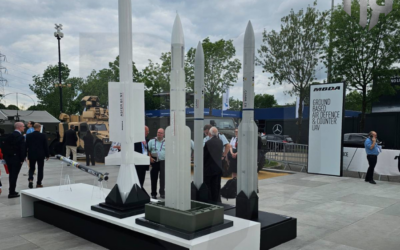
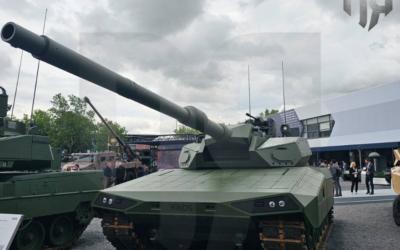


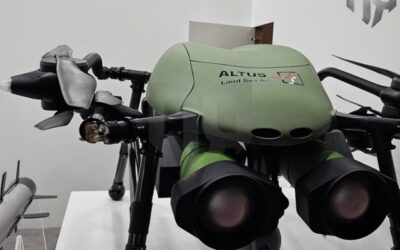

0 Comments